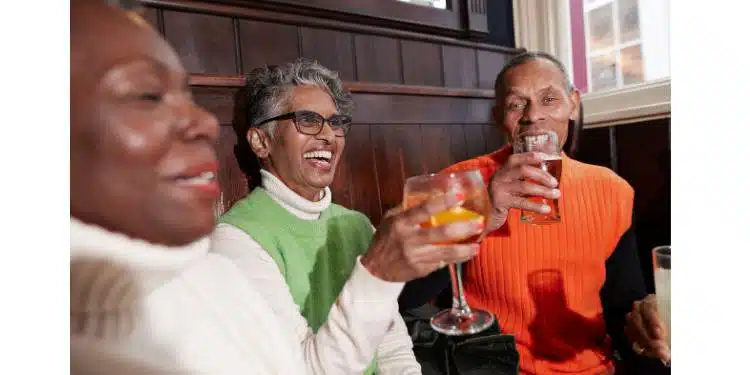by Debi Talbert
“Gray area drinking” typically refers to a situation where individuals consume alcohol in a manner that falls between moderate, responsible drinking and heavy, problematic drinking. It’s a term used to describe situations where someone might not necessarily meet the criteria for alcohol dependence or addiction, but their drinking habits could be considered unhealthy or potentially risky. Here’s my story:
Life is Good – Or Is It?
Life appeared, to the outside world, to be going really well for me. I traveled the world as a flight attendant. With expenses paid, I enjoyed dinners with my military child stationed overseas and sipped wine in France, Germany, Spain and Italy.
I drank with coworkers on my layovers. At home, I enjoyed cocktails with friends and family. Weekends included brunch and mimosas. I attended networking events with free-flowing alcohol. Date nights with my husband involved dinner and drinks. And of course, when I hosted family events, I proudly served a wide variety of alcoholic beverages.
Alcohol Everywhere – Is That a Problem?
Every event or gathering involved drinking. In my world this was “normal”. I wasn’t the only one drinking this way; everyone I knew drank the same way. It was just part of life. I enjoyed this lifestyle for years, never wondering why I was always the one to finish the wine bottle or if other people went home from a party and helped themselves to another drink. On our flights back across the Atlantic, our crew laughed together as we tried to piece together the night. We had a great time filling in the blanks for each other.

Gray Area Drinking (GAD)
I didn’t learn until years later that my style of drinking is called Gray Area Drinking (GAD). GAD is the space between the extremes of rock-bottom drinking and every-now and again drinking. The Gray Area Drinker generally does not look like the stereotypical alcoholic or suffer the extreme consequences you might expect from a heavy drinker. I functioned quite well, easily fooling myself and others, as I gave the appearance that life was wonderful. The outside world assured me I was “not that bad” or that “it’s not like you have a problem or anything”. We were all in denial.
The truth is that most Gray Area Drinkers, me included, surround themselves with people who drink similar amounts of alcohol. By doing so, we don’t have to acknowledge that the amounts consumed are, in fact, unhealthy.
As alcohol is addictive, Gray Area Drinking can become a much bigger problem. Our bodies build up a tolerance for alcohol and larger amounts of alcohol become necessary to bring you to your happy place. Deep down, during my Gray Area Drinking days, I knew something was wrong and that the amount of alcohol I consumed was not healthy for my body. If you start to question your drinking habits, you are very likely in the “gray area”.
Finding Support and Community
Awareness is the first step to change. You can choose to address your drinking while in the “gray area”, before your body becomes physically addicted. The good news is that help is available in many forms in today’s world. Online communities, blogs, podcasts, therapists and coaches are all good options to explore. Find one that works for you and know you are not alone. Admitting you might have a problem can lead to feeling isolated because of the stigma associated with not being able to “drink normal”.

How to Make a Change?
Change is hard. Here are my tips on how to start when you are ready.
Ask yourself the hard questions.
Why do you turn to alcohol?
What problem do you have that you think a drink will solve?
Are you drinking to avoid dealing with stress?
Begin to incorporate healthy habits into your life to help you relax and have fun.
Try to drink at least 64 oz of water and get 8 hours of sleep each night and add exercise to your schedule, starting slowly. These simple steps help manage stress and make you pause before picking up a drink.
Staying Sober Is in Style
Alcohol isn’t going away, but the paradigm is definitely changing. In a world that embraces alcohol in abundance, it’s interesting that the “sober curious” movement is catching on. It’s trendy to take a break from alcohol these days. The benefits of not drinking are many; no hangovers, more clarity, better skin and weight loss, to name a few.
FAQs About Gray Area Drinking (GAD)
Do you think you may have an issue with gray area drinking? Or are you concerned about a friend? Here are some commonly asked questions along with answers which we hope will be helpful.
What is gray area drinking?
Gray area drinking refers to patterns of alcohol consumption that fall between moderate, responsible drinking and heavy, problematic drinking. It’s a term used to describe behaviors that might not meet the criteria for alcohol dependence or addiction but could still be considered risky or unhealthy.
How do I know if my drinking is in the gray area?
If you’re unsure whether your drinking habits are in the gray area, consider factors such as the frequency of heavy drinking, binge drinking episodes, or using alcohol to cope with emotions. If your alcohol consumption occasionally causes negative consequences or you feel concerned about it, it might be worth discussing with a healthcare professional.
Is gray area drinking the same as alcoholism or addiction?
No, gray area drinking is not the same as alcoholism or addiction. Gray area drinking implies a level of ambiguity in terms of the severity of drinking behavior. Alcoholism and addiction involve a higher level of dependence on alcohol, causing significant negative impacts on various aspects of life.
What are some signs of problematic gray area drinking?
Signs might include frequently drinking more than intended, feeling guilty about drinking habits, having difficulty cutting down on alcohol consumption, or experiencing negative consequences from drinking, such as conflicts in relationships or poor performance at work.
How can I cut back on gray area drinking?
If you want to cut back on your alcohol consumption in the gray area, consider setting clear limits for yourself, finding alternative ways to cope with stress or emotions, seeking support from friends and family, and avoiding situations that trigger excessive drinking.
When should I seek help for my drinking habits?
If you find that your drinking is causing negative consequences in your life, affecting your health, relationships, or work, it’s a good idea to seek help. You can talk to a healthcare professional, therapist, counselor, or support groups specialized in alcohol-related concerns.
Is there a “normal” amount of alcohol I can consume in the gray area?
What’s considered a “normal” amount of alcohol can vary from person to person. However, guidelines from health organizations often suggest moderate drinking, which is generally defined as up to one drink per day for women and up to two drinks per day for men.
Can gray area drinking lead to alcoholism?
While gray area drinking might not necessarily lead to full-blown alcoholism, consistently engaging in risky drinking behaviors can increase the likelihood of developing more serious alcohol-related problems over time. It’s important to address unhealthy drinking habits before they escalate.
What resources are available for people concerned about gray area drinking?
There are various resources available, including alcohol education websites, hotlines, support groups (like Alcoholics Anonymous), therapists, and counselors who specialize in substance use issues. Your healthcare provider can offer guidance and referrals as well.
Is it possible to drink in moderation after a period of gray area drinking?
Yes, many people are able to adjust their drinking habits from the gray area to more moderate and responsible consumption. However, if you find it challenging to do so on your own, seeking professional support can provide you with strategies and guidance to make this transition successfully.
About the Author: Debi Talbert
 Debi Talbert is a Certified Life Coach with The Life Coach School and This Naked Mind Institute. She coaches the 50 plus individual who is exhausted trying to figure out how to end their dysfunctional relationship with alcohol. She helps people who struggle to stop drinking, but do not accept the labels of “alcoholic” or “powerless”.
Debi Talbert is a Certified Life Coach with The Life Coach School and This Naked Mind Institute. She coaches the 50 plus individual who is exhausted trying to figure out how to end their dysfunctional relationship with alcohol. She helps people who struggle to stop drinking, but do not accept the labels of “alcoholic” or “powerless”.
Debi knows at a deeply personal level that Life Coaching is transformative. She helps clients rebuild their trust in themselves and change their beliefs about life. She is the creator of “Exit the Drinking Life” podcast and offers online programs which include training videos and weekly live coaching sessions. In addition, she offers a monthly membership to teach you to coach yourself, teach you how to feel better, teach you to take massive action and flourish in life beyond alcohol. Find information about programs and resources at jumpseatcoaching.com.











Awesome content! All need to read. So many gray area drinkers out there. I was one of them.
Thank you for sharing your thoughts
This was a very interesting enlightening article and would love to hear more from Debi
I agree! Her articles are honest, enlightening and I’m sure very helpful to many. Thanks for your comment.
Very enlightening article, Debi, thanks for sharing your knowledge!
Thanks for your comment!